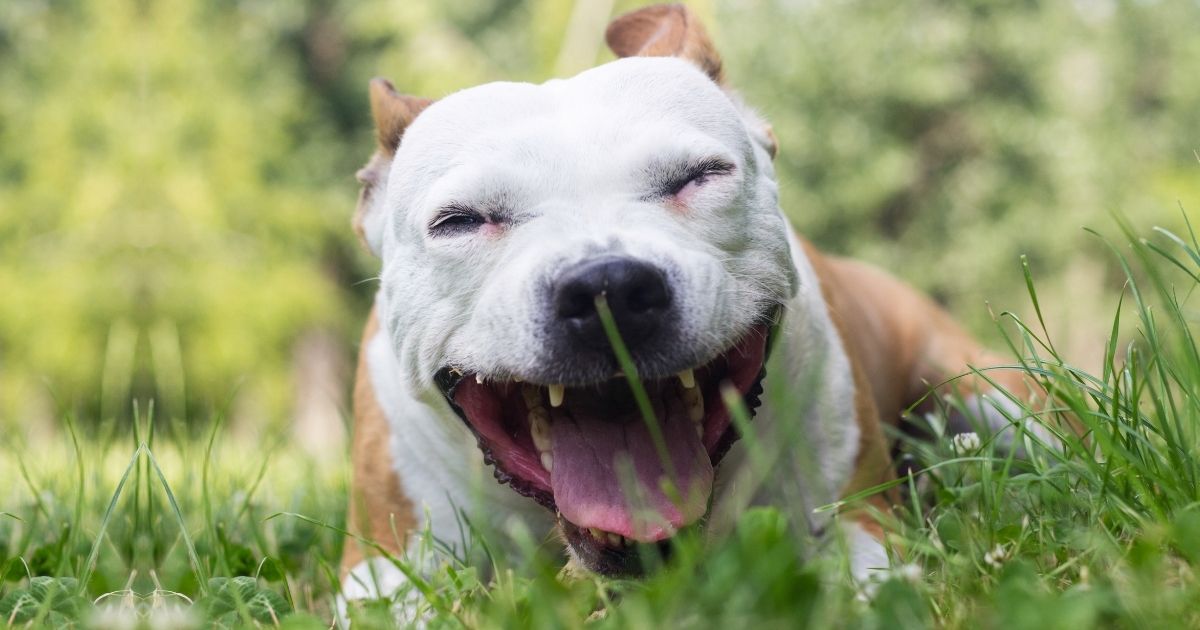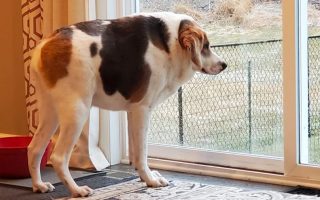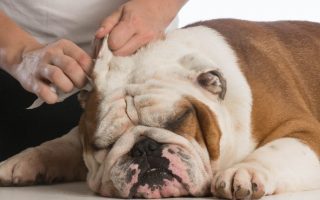You know you heard it, but you’re not sure, so you listen again.
What you heard was indeed correct. Your beloved pooch is making unusual sounds, one that sounds as if it is about to vomit but isn’t.
As a good pet parent, you are concerned.
Why is my dog dry heaving? What is going on?
The above scenario occurs more than you imagine, and it is one pet parents dread.
While it is normal for a dog to suffer from stomach upset and vomit sometimes, dry heaving sounds more serious, and it is.
Far from being a minor issue, dry heaving requires immediate attention.
That being said, you still need to be sure why your dog is dry heaving as it could be suffocating from a bone in its throat or struggling with some other condition.
Knowing dry heaving and its symptoms will also help when the veterinarian asks questions while diagnosing.
Therefore, this article with take you through an explanation of dry heaving, its symptoms, prevention, and the appropriate steps to take.
What is Dry Heaving in Dogs?
According to some experts, dry heaving occurs when a dog shows signs of vomiting, but without doing that.
It makes gagging sounds and looks disturbed without releasing any substance from the throat.
Dry heaving is “the action of attempting to vomit, but no vomit is produced.”
Some other conditions act like dry heaving, and it is easy to mix up both.
You must be sure your pooch is dry heaving, and not displaying symptoms of another issue.
If you do have doubts, simply take your pet to the veterinarian.
However, some of these other issues may not be as serious as dry heaving, so distinguishing the sounds would help you know what you’re up against.
Reverse sneezing is one act that can confuse owners into thinking their dogs are dry heaving.
The sounds and motions are almost the same but aren’t.
Coughing can equally be similar to dry heaving, but the latter shakes a dog’s body more.
Then there is actual vomiting, but here we can tell the difference once your pooch brings out vomit.
To accurately ascertain whether or not your dog is dry heaving, know the symptoms.
What are the Symptoms of Dry heaving in Dogs?
When your dog is dry heaving, there are some symptoms it will display. Some of them are:
- Gagging
- Retching
- Occasional shake of the body
- Display of discomfort and even pain
- Weakness
Why is My Dog Dry Heaving?
If you are sure your dog is dry heaving (and not coughing or reverse sneezing) then it could be caused by different things.
Because one can never be sure, dry heaving should be considered an emergency and treated as such.
Here are the common causes of dry heaving:
1. Gastric dilatation and volvulus
This is commonly known as bloating and is a critical condition that can be fatal if left untreated.
Bloating happens when the affected dog’s stomach fills up with gas, fluid, food, or any other substance that makes it swell.
The stomach also twists, preventing blood from reaching major organs like the heart.
Dry heaving is a dog’s attempt to release the gas stuck in its stomach.
2. A stuck object in the throat
A dog could also dry heave to get rid of an object stuck in its throat.
The object could be choking it and can lead to suffocation if nothing is done.
Do not try to remove the object yourself as you could be endangering your pooch further by pushing the object down its throat or injuring it.
Take it to a veterinarian to do the job.
3. Kennel cough
This is a respiratory condition that leads to dry coughing and a runny nose.
It is highly contagious and should not be allowed to spread if you run home with other dogs.
Kennel cough can make a dog dry heave as it struggles to cough out.
4. Tumor
This is as serious in dogs as it is with humans. Dry heaving can be a result of a throat tumor, and only surgery can set your dog free.
The tumor should not be allowed to keep growing or it would bring further complications.
5. Tonsillitis
This is caused by a swelling of the tonsils located in the throat. When they swell, they restrict a dog’s breathing, making it a dry heave.
6. Stomach upset
Just as a stomach upset can make a dog vomit; it can also cause the dog to dry heave, depending on the circumstance.
You may notice additional symptoms like lethargy, drooling, and loss of appetite.
7. Respiratory issues
Respiratory illnesses manifest in many ways—dry heaving being one of them.
When a dog suffers from pneumonia, fungal infection, distemper, and any other respiratory problems, it can cause it to dry heave.
8. Eating fast
Though not a medical condition, rushing down food can make a dog dry heave as it struggles to swallow.
Rushing food can also cause obesity and even bloating, so it is a habit you should discourage.
My Dog Keeps Dry Heaving: What Can I Do?
If you notice your dog continuously dry heaving, do not panic.
Dogs can easily pick up on the owner’s mood and it can worsen the situation.
Attempt calming your pooch down so it won’t harm itself, before taking the next step.
Some home remedies can calm your dog, but know that it doesn’t guarantee an immediate cure.
The best solution is to take your pooch to the veterinarian as dry heaving is usually a sign of a critical condition.
If the issue isn’t an emergency, your veterinarian is still in the best position to diagnose and prescribe treatment.
How to Prevent Dry Heaving in Dogs
There is no guarantee that you could stop your dog from ever dry heaving, but you can take preventive measures to reduce the chances of this happening.
With these, you protect your pet and help it stay healthy.
These preventive measures include:
- Get a slow feeder so your dog won’t be tempted to wolf down its meal. As we’ve seen, rushing a meal is not to a dog’s advantage.
- Vaccinate your pet against kennel cough, especially if your dog is often in public and meets other canines. Vaccination preserves your dog from this illness.
- Keep objects a dog can easily swallow far from it. If you want to get a chew toy, find one that’s bigger than your pet’s muzzles. Avoid feeding it raw bone or tiny ones from the chicken as those can lodge in its throat.
- Do not let your dog eat grass, fiber, and human food that can cause stomach upset.
- Do not exercise your dog or let it do any activity immediately before or after a meal.
- Treat any issues with speed. If possible, have a veterinarian on standby for an emergency. You can also locate the closest vet hospital in your neighborhood.
When to See a Vet About Your Dog Dry Heaving
Ideally, you should see a vet as soon as you notice your dog dry heaving.
However, if it happens between meals, there may be no need.
Changing your dog’s feeding pattern might do the trick. If it is sporadic, it shouldn’t be a problem as well.
When it is repeated and the dog displays some other symptoms, take it to the veterinarian in time.
Why does my dog keep trying to throw up?
If your dog retches, gags or shows other outward signs of throwing up without actually doing so, your dog might be dry heaving.
How do I know if my dog has GDV?
Gastric dilatation and volvulus (GDV) is a serious condition that requires immediate medical condition.
Besides making your dog dry heave, GDV would also lead to a swollen stomach, fatigue, and pain.
Is dry heaving serious?
In most cases, dry heaving should be treated as an emergency as it could be the sign of an underlying and fatal medical condition.
How long can a dog live with a twisted stomach?
A twisted stomach is caused by bloating, which is a critical condition. It takes minutes for this condition to kill a dog. This is why it must be treated as an emergency.
Final Thoughts
Dry heaving may not seem serious, but do not ignore your dog once it begins reacting in this manner.
Your immediate action might just save its life.
This condition should not be treated lightly, especially when it is continuous and the dog shows other symptoms.
You May Like:
How Many Nipples Does A Dog Have? Find Answers
References: Emergency Vets USA







